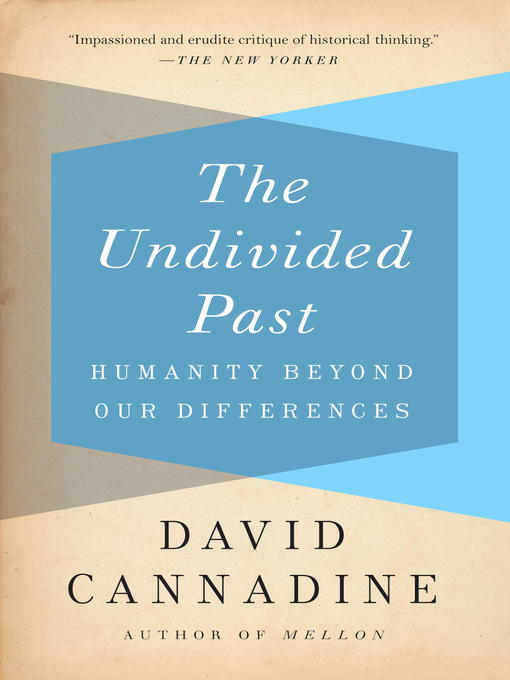
The Undivided Past
Humanity Beyond Our Differences
کتاب های مرتبط
- اطلاعات
- نقد و بررسی
- دیدگاه کاربران
نقد و بررسی

February 11, 2013
Readers able to navigate the dense roundabout writing style of historian/Princeton lecturer Cannadine (Mellon: An American Life) will find a complex, thoughtful examination of the fundamental ways in which humanity divides itself. While these all stem from an innate “us vs. them” mentality, Cannadine takes the investigation a step further, looking at how we think of ourselves in terms of religion, class, nation, race, gender, and civilization. Even then, he points out that it’s never as simple as “man vs. woman” or “Christian vs. Muslim”—a wide variety of factors can create numerous factions and differences within any grouping. Indeed, he speaks out against the “misleading but widespread practice” of “totalizing,” or “describing and defining individuals by their membership of one group.” It’s all a build-up for his conclusion: “We need to see beyond our differences... to embrace and to celebrate the common humanity that has always bound us together.” Unfortunately, the message may be lost due to Cannadine’s penchant for $10 words, complex sentences, alliteration, and thesaurus abuse. It might make for a great lecture, but easy reading it isn’t. Determined scholars, however, will be rewarded for their persistence. Agent: Michael Carlisle, Inkwell Management.

Starred review from February 15, 2013
Historian and editor Cannadine (History/Princeton Univ.; Mellon, 2006, etc.) constructs a stirring critique of history that questions conventional approaches to narrating the human chronicle. The author rejects the Manichaean simplicities of "us vs. them" and "good vs. evil" embodied in traditional histories' preoccupation with "difference" as well as the alleged uniformity of antagonistic groups. Cannadine investigates the categories of religion, nation, class, gender, race and "civilization" to reveal the persistence of thinking in adversarial absolutes--the malevolent or hapless "other"--and the incalculable damage this mindset has caused. He insists that we indulge in arbitrary, incomplete group "identities" and ignore at our peril the interactions that go on across supposedly impermeable boundaries. Knighted in 2009 for his distinguished service and Chair of the National Portrait Gallery since 2005, the author is no Pollyanna. In assaying the work of such predecessors as Gibbon, Huntington and Toynbee, as well as contemporaries of the caliber of Fernandez-Armesto, he acknowledges the strife that has occurred within these often self-contradictory categories but argues convincingly that such tensions are far outweighed by a history of mutual borrowing and cross-fertilization between peoples. Of particular salience are his observations on religion and perception as expressed in a divergent view of the relationship between Christianity and Islam. That we exaggerate animosities and fail to recognize how cooperation, at least as much as conflict, has marked humanity's experience, may seem a belaboring of the obvious. Yet Cannadine, an accomplished writer, details it in fresh and provocative terms. A generally persuasive, impassioned book-length essay. While his conclusions (and language) sometimes grow repetitive, they nonetheless serve to underscore at every turn an incisive argument buttressed by millennia of evidence.
COPYRIGHT(2013) Kirkus Reviews, ALL RIGHTS RESERVED.

April 15, 2013
Sir David Cannadine (history, Princeton Univ.; The Decline and Fall of the British Aristocracy), an acclaimed historian of 19th- and early 20th-century British society and economic life, tackles the now rare form of grand world history and world intellectual history in arguing that the total record of humankind displays more solidarity than conflict. He draws on an exhaustive list of classics and historiographical landmarks--many written by his professional friends from across the ideological spectrum--to posit that all of the major categorizations of society--religion, nation, class, gender, race, and civilization--are typically regarded as struggles against the Other, but that a long-view analysis shows these (overlapping) contests for hegemony resolving themselves into practical accommodation. His antipathy to class as a valid concept is particularly conspicuous, as is his ambivalence about the relevance and utility of the nation-state. VERDICT Cannadine writes with great clarity and subtlety, and while the persuasiveness of his thesis is not assured, he is certainly clear-eyed about the case he makes for human commonality. There's something here for any serious student of history to find insightful (or dubious); such readers will thrill at Cannadine's erudition, logic, and prose.--Scott H. Silverman, Dresden, ME
Copyright 2013 Library Journal, LLC Used with permission.

Starred review from March 1, 2013
For much of recorded history, human beings have argued and even gone to war on the basis of perceived differences of religion, nationality, class, gender, race, and civilization. But we're not doomed to keep viewing the world as us versus them, argues historian Cannadine. If we move beyond binary notions of good and evil, we can instead focus on our common humanity. Cannadine systematically examines the six most pervasive areas of identities across historical periods, as well as the role of theologians, historians, politicians, and pundits in continually emphasizing differences. For example, historical interactions between Christianity, Islam, and Judaism were far more nuanced and fluid, with as many conflicts within the religious groups as among them, than is now commonly understood. Despite undeniable differences, the common areas of conflict have come from particular group interests, exaggerated notions of the importance of the differences, an insistence on a binary perspective, and reinforced historical accounts that deny our commonalities. Drawing on history, philosophy, economics, sociology, and religion, Cannadine offers a broad and sweeping look at the myriad ways we've been at each other's throats throughout history. Still, he ends with the hopeful prospect that more historians will reexamine the chronicles of group conflicts and offer balanced perspectives.(Reprinted with permission of Booklist, copyright 2013, American Library Association.)

























دیدگاه کاربران